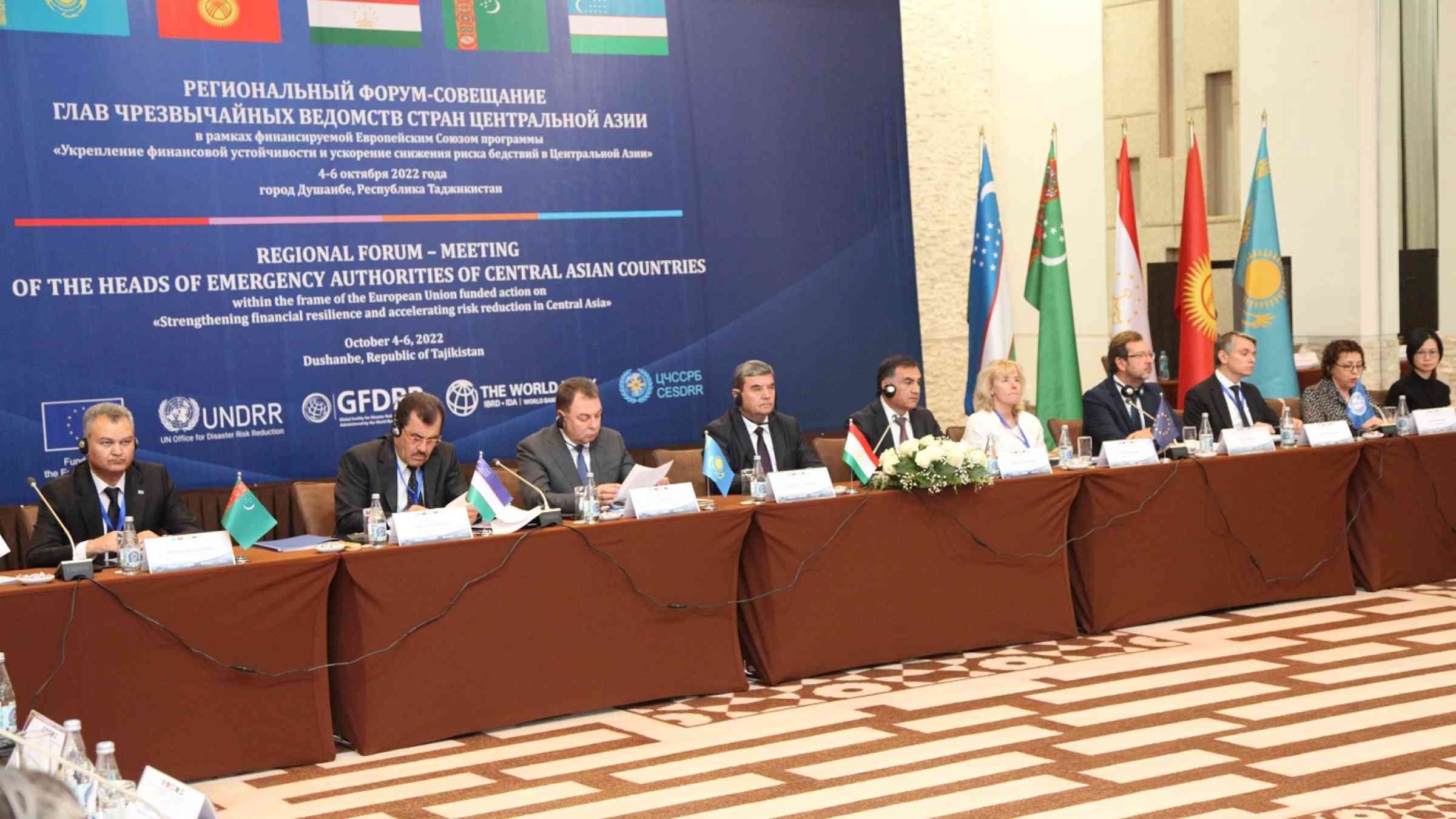Regional forum on disaster risk reduction: strengthening the resilience of Central Asia

DUSHANBE, October 6, 2022 – A three-day Regional Forum - Meeting of the Heads of Emergency Authorities in Central Asia concluded today in Dushanbe, Tajikistan.
This high-level annual meeting has brought together heads of emergency situations authorities and other government officials from all five Central Asian countries, as well as international development institutions, experts and representatives of academic and research institutions in the area of natural hazards and disaster risk management. Participants discussed measures to enhance regional cooperation and strengthen the resilience of Central Asian countries, as well as prospects for a regional early warning system and implementation of information and communication technologies for disaster risk reduction (DRR) in the region.
In her opening remarks, Ms. Terhi Hakala, EU Special Representative for Central Asia underlined: “From the EU perspective, Disaster Risk Reduction in Central Asia cuts across many sectors, including water, agriculture, climate change, energy, security, health. Currently the EU finances nine major projects worth almost EUR 40 million that help strengthen DRR systems and build climate resilience. We value our cooperation in this area with our Central Asian partners, UN agencies, the OSCE, World Bank, EBRD and International Science and Technology Center, and the Center for Emergency Situations and Disaster Risk Reduction in Almaty.”
In his opening remarks, Mr. Octavian Bivol, Chief, UNDRR Regional Office for Europe and Central Asia said: “This Forum is a chance to strengthen regional cooperation around disaster risk reduction, so climate and disaster risks no longer threaten Central Asia’s future. The region has an agreed Strategy and Roadmap, so we must now accelerate implementation to meet the goals of the Sendai Framework for Disaster Risk.”
The meeting has been hosted by the Committee of Emergency Situations and Civil Defense under the Government of the Republic of Tajikistan and supported by the Center for Emergency Situations and Disaster Risk Reduction (CESDRR), which acts as a secretariat of the Regional Forum. This event has been financially supported by the European Union (EU), with the technical support and coordination of the World Bank, Global Facility for Disaster Reduction and Recovery (GFDRR), and UN Office for Disaster Risk Reduction (UNDRR).
Delegates jointly reviewed and made recommendations on the next steps for the Action Plan (Roadmap) to take forward the regional ‘Strategy of Cooperation in Central Asia for Disaster Risk Reduction for 2022 – 2030, which had been adopted at the last Regional Forum held in Tashkent in 2021.
The EU supports Central Asian countries in strengthening their disaster resilience and accelerating risk reduction through a two-tiered regional initiative, which started its implementation in 2019. The initiative has two results areas, whereby UNDRR supports strengthening regional, national and local coordination, governance systems and strategies in DRR, disaster data collection mechanisms, and monitoring progress in the achievement of the goals set in the Sendai Framework 2015-2030. The second result area is implemented by the World Bank under the management of GFDRR and focused on strengthening the evidence and capacity for financial resilience and risk reduction at national and regional levels in Central Asia. Both result areas are implemented in close collaboration with the Almaty-based CESDRR.
On October 4, an extended meeting of the Regional Scientific and Technical Council (RSTC) took place where the findings of the new regional risk assessment for Central Asia and selected country reports with a focus on strengthening resilience of the social protection systems were presented. Furthermore, roundtables were held where participants discussed prospects for emergency preparedness and response through disaster risk financing and the role of the RSTC in supporting disaster risk management agenda in the region. In addition, the participants learnt about additional models for disaster risk assessment in the region from other development partner initiatives (ADB).
On October 5, delegates reviewed the implementation of the Action Plan (Roadmap) for the Strategy for Development of Cooperation of Central Asian countries in DRR for 2022-2030 and analyzed cross-border cooperation on man-made risks such as industrial/technological accidents. In addition, participants were presented with the approach of disaster risk financing in the region based on the example of Tajikistan.
On the final day representatives of the emergency authorities of the Central Asian countries together with experts from international development organizations and scientific institutions reviewed and approved several proposed programs and initiatives to further strengthen regional cooperation on DRR, climate change adaptation, and emergency situations. Also, delegates reviewed objectives and dedicated action plan for 2023-24 in the priority areas of the Action Plan (Roadmap) for the implementation of the Strategy for Development of Cooperation of Central Asian countries in DRR.
For additional information, please contact:
EU Delegation to Kazakhstan: delegation-kazakhstan-pic@eeas.europa.eu;
Mr. Abdurahim Muhidov, UNDRR Regional Programme Coordinator: muhidov@un.org
Ms. Chyi-Yun Huang, Senior Urban Development and Disaster Risk Management Specialist, World Bank, e-mail: chuang@worldbank.org.